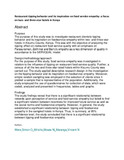| dc.contributor.author | Were, Simon O | |
| dc.contributor.author | Miricho, Moses N | |
| dc.contributor.author | Maranga, Vincent N | |
| dc.date.accessioned | 2021-06-01T15:25:26Z | |
| dc.date.available | 2021-06-01T15:25:26Z | |
| dc.date.issued | 2021-01-19 | |
| dc.identifier.uri | https://doi.org/10.1108/IHR-07-2020-0026 | |
| dc.identifier.uri | https://www.emerald.com/insight/content/doi/10.1108/IHR-07-2020-0026/full/html | |
| dc.identifier.uri | http://r-library.mmust.ac.ke/123456789/1543 | |
| dc.description.abstract | Purpose
The purpose of this study was to investigate restaurant clientele tipping behavior and its inspiration on foodservice empathy within two- and three-star hotels in Kisumu County, Kenya. This was with the objective of analyzing the tipping effect on restaurant food service quality with an emphasis on Parasuraman, Zeithmal and Barry's empathy as a key dimension of quality in accordance to the SERVQUAL model.
Design/methodology/approach
For the purpose of this study, food service empathy was investigated in relation to the influence of tipping on restaurant food service quality. Further, a census of all the two and three star-rated hotels within Kisumu County was carried out. The study applied descriptive research design in the investigation on the tipping behavior and its inspiration on foodservice empathy. Moreover, simple random sampling was employed in the selection of clients since it yielded a sample that is representative of the population. Additionally, the study employed the use of questionnaires for collection of data, which were coded, analyzed and presented in frequencies, tables and graphs.
Findings
The study findings reveal that there is a significant relationship between rewards upon perception of service and food service empathy but failed to find a significant relation between incentives for improved future service as well as the social norms and foodservice empathy. However, in general, the study established a significant relationship between tipping and foodservice empathy in the sampled hotels in Kenya. Thus, in summary, at 95% confidence level, the study concluded that there is a significant relationship between tipping and foodservice empathy. | en_US |
| dc.language.iso | en | en_US |
| dc.publisher | International Hospitality Review | en_US |
| dc.subject | Restaurant, tipping ,behavior, inspiration, food service empathy | en_US |
| dc.title | Restaurant tipping behavior and its inspiration on food service empathy | en_US |
| dc.title.alternative | A focus on two- and three-star hotels in Kenya | en_US |
| dc.type | Article | en_US |

